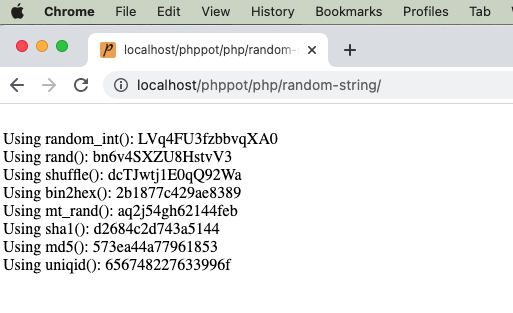PHP Random String Generator: Create Secure Passwords
Learn how to generate random strings in PHP with different options for length, character sets, and more.
Learn how to generate random strings in PHP with different options for length, character sets, and more.
Generating random strings in PHP is a common task, whether you're creating unique identifiers, passwords, or security tokens. Here's a breakdown of how to generate cryptographically secure random strings in PHP, along with options for customization:
random_bytes($length) to generate cryptographically secure random bytes.
$randomBytes = random_bytes(10); bin2hex() is a common choice:
$randomString = bin2hex($randomBytes);$characters = 'abcdefghijklmnopqrstuvwxyz0123456789';$string = '';
for ($i = 0; $i < $length; $i++) {
$randomIndex = random_int(0, strlen($characters) - 1);
$string .= $characters[$randomIndex];
}Explanation:
random_bytes() is the foundation for secure random string generation in PHP.Important Considerations:
random_bytes().This PHP code defines a function called generateRandomString that generates random strings of a specified length. It allows users to optionally provide a custom set of characters to use in the random string. The function utilizes cryptographically secure methods for generating random data. The code also includes examples demonstrating how to use the function to create random strings with and without custom character sets.
<?php
/**
* Generates a random string.
*
* @param int $length The desired length of the random string.
* @param string|null $characters A string of characters to use for the random string. If null, alphanumeric characters are used.
*
* @return string The generated random string.
*/
function generateRandomString(int $length, ?string $characters = null): string
{
// Use a strong source of randomness
$randomBytes = random_bytes($length);
// Encode the bytes into a hexadecimal string
$randomString = bin2hex($randomBytes);
// If no custom character set is provided, use alphanumeric characters
if ($characters === null) {
$characters = 'abcdefghijklmnopqrstuvwxyzABCDEFGHIJKLMNOPQRSTUVWXYZ0123456789';
}
// Generate the random string using the specified character set
$string = '';
for ($i = 0; $i < $length; $i++) {
$randomIndex = random_int(0, strlen($characters) - 1);
$string .= $characters[$randomIndex];
}
return $string;
}
// Example usage:
$randomString1 = generateRandomString(16); // Generates a 16-character random string using alphanumeric characters
$randomString2 = generateRandomString(20, '!$%^&*()_+=-`~[]\{}|;\':",/<>?'); // Generates a 20-character random string using special characters
echo "Random string 1: " . $randomString1 . "\n";
echo "Random string 2: " . $randomString2 . "\n";Explanation:
generateRandomString() function:
$length and an optional $characters string as input.random_bytes().bin2hex().$characters is provided, it uses them to build the string. Otherwise, it defaults to alphanumeric characters.Example Usage:
Key Points:
random_bytes() as the source of randomness.bin2hex(): While bin2hex() is simple, it limits your random string to hexadecimal characters. You can use base64_encode() for a wider range, but remember to handle potential URL-unsafe characters (+, /, =) if needed.random_int() vs. rand(): Always prioritize random_int() for cryptographic purposes. It uses a cryptographically secure pseudorandom number generator (CSPRNG), unlike the older rand() function.random_bytes() and related functions.random_bytes() is reliable, it's good practice to include error handling in case of unexpected issues. You can wrap the function call in a try...catch block to gracefully handle potential exceptions.This document outlines how to generate secure random strings in PHP, crucial for tasks like creating CSRF tokens or unique identifiers.
Key Steps:
random_bytes($length) to obtain cryptographically secure random data. This is the foundation of the process.bin2hex($randomBytes).Important Points:
random_bytes() for true randomness.By following these guidelines, you can generate random strings in PHP that are both secure and tailored to your specific needs. Remember to prioritize security when necessary, especially for sensitive operations, and always be mindful of potential collisions when uniqueness is paramount.
 random_bytes - Manual - PHP | PHP is a popular general-purpose scripting language that powers everything from your blog to the most popular websites in the world.
random_bytes - Manual - PHP | PHP is a popular general-purpose scripting language that powers everything from your blog to the most popular websites in the world. Generating Random String Using PHP - GeeksforGeeks | A Computer Science portal for geeks. It contains well written, well thought and well explained computer science and programming articles, quizzes and practice/competitive programming/company interview Questions.
Generating Random String Using PHP - GeeksforGeeks | A Computer Science portal for geeks. It contains well written, well thought and well explained computer science and programming articles, quizzes and practice/competitive programming/company interview Questions. Is it possible to generate a CSRF-token (random string) to use with a ... | I’m trying to secure a contact form by generating a CSRF token that can be handed off to the PHP script that emails the form content. My first thought was to include a few lines of PHP on the contact page that would create and store a random string in the php-variable $token, but I never got Hugo to output the contact page as a .php file. (I tried defining a custom outputFormats and mediaTypes in the config and adding a single.php file in /layouts/_default/, without any luck. Hugo refused to m...
Is it possible to generate a CSRF-token (random string) to use with a ... | I’m trying to secure a contact form by generating a CSRF token that can be handed off to the PHP script that emails the form content. My first thought was to include a few lines of PHP on the contact page that would create and store a random string in the php-variable $token, but I never got Hugo to output the contact page as a .php file. (I tried defining a custom outputFormats and mediaTypes in the config and adding a single.php file in /layouts/_default/, without any luck. Hugo refused to m... How to Generate PHP Random String Token (8 Ways) - Phppot | PHP script to generate random string tokens with eight different ways and example.
How to Generate PHP Random String Token (8 Ways) - Phppot | PHP script to generate random string tokens with eight different ways and example.![[SOLVED] generate random string that isn't already in DB - PHP ...](https://forums.phpfreaks.com/uploads/set_resources_1/84c1e40ea0e759e3f1505eb1788ddf3c_default_photo.png) [SOLVED] generate random string that isn't already in DB - PHP ... | Hello, I have found many functions that generate random strings i am currently using one that works well. But here is a potential problem I would like to stop before it happens. I'm inserting the random string into a db and need it to be unique if the string exist I need it to create another one....
[SOLVED] generate random string that isn't already in DB - PHP ... | Hello, I have found many functions that generate random strings i am currently using one that works well. But here is a potential problem I would like to stop before it happens. I'm inserting the random string into a db and need it to be unique if the string exist I need it to create another one.... Can hash be used to create very good random strings? - PHP ... | I’m wondering if using a good hash algorithm (for example sha-2) can be used to generate random strings that are more random and unpredictable than rand() or mt_rand() functions (which are vulnerable to small seed entropy and other potential weaknesses). My idea is to get a number of always changing data, concatenate them and then hash them. I could be using: sytem time with microseconds result of uniqid() with more entropy a salt string created with traditional mt_rand() execution time of the...
Can hash be used to create very good random strings? - PHP ... | I’m wondering if using a good hash algorithm (for example sha-2) can be used to generate random strings that are more random and unpredictable than rand() or mt_rand() functions (which are vulnerable to small seed entropy and other potential weaknesses). My idea is to get a number of always changing data, concatenate them and then hash them. I could be using: sytem time with microseconds result of uniqid() with more entropy a salt string created with traditional mt_rand() execution time of the...